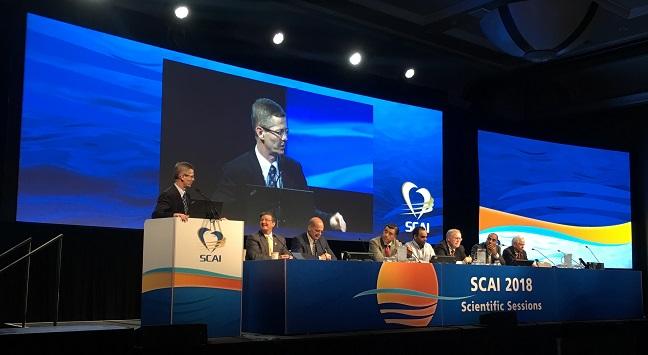Heart Function, QoL Improvements at 1 Year in US Postapproval MitraClip Registry: PAS-1
There were few insights for functional MR, but for degenerative disease, the new data point to sustained improvements in NYHF class and MR grade.

SAN DIEGO, CA—One-year outcomes among the first 2,000 patients with degenerative mitral regurgitation (MR) treated with the MitraClip in the United States since device-approval suggest that the intervention improves heart function and quality of life.
According to James Hermiller, Jr, MD (St. Vincent Heart Center, Indianapolis, IN), who presented the new data during a late-breaking session of the Society for Cardiovascular Angiography and Interventions 2018 Scientific Sessions, outcomes in patients treated after the device became commercially available suggest that it “remains a safe and effective therapeutic option for select patients and has not presented any new concerns during the follow-up of the Post Approval Study-1 (PAS-1).”
Over 60,000 patients worldwide have been treated with the MitraClip (Abbott), the bulk of them outside the US, where the device, in many countries, has been available for almost a decade. The US Food and Drug Administration granted approval in 2013 for patients with significant symptomatic degenerative mitral regurgitation at prohibitive risk for surgery.
Last year, Paul Sorajja, MD (Minneapolis Heart Institute, Minnesota), and colleagues presented and published data also looking at almost 3,000 of the first commercially treated patients; that study drew on the Society of Thoracic Surgeons/American College of Cardiology (STS/ACC) TVT Registry as well as Centers for Medicare & Medicaid Services administrative claims data. The snapshot Hermiller provided here today also relied on numbers pulled from the STS/ACC TVT data, but zeroed in on functional and quality of life outcomes. According to Hermiller, it is the first and largest report to look at echocardiographic and clinical outcomes in degenerative MR patients.
Mean age of these first 2,000 patients was 80, and 44% were female. The vast majority (86%) were in NYHA functional class III/IV at the time of their procedures, with 95% having a MR grade 3+ or greater. More than 40% also had coronary artery disease along with a range of other cardiac comorbidities.
Survival at 1 year was 78.1%, which Hermiller noted was consistent with other patient series. The most common adverse events at 1 year were mitral valve reinterventions, at 2.4%, and readmission for heart failure, at 6.5%.
Importantly, functional improvements were accompanied by “dramatic” and “remarkable” gains in quality of life scores, Hermiller said during this late-breaking presentation. Six-minute walk test increased by 38 m from baseline to 1 year, an improvement that Hermiller characterized as “substantial.”
At 1 year, 41% of patients had MR grades of 1+ and 45.6% had MR grades of 2+, and the difference in the proportion of patients with MR grade 2+ or less at baseline compared with 1 year was statistically significant (5.1% vs 86.6%, P < 0.0001). Improvements in left ventricular volume and dimension from baseline were seen at both 30 days and 1 year, as were reductions in NYHA functional class. By 1 year, 83% of patients were in NYHA class I or II.
“Commercial use of the MitraClip device remains a safe and effective therapeutic option for select patients and has not presented any new concerns during the follow-up of the PAS-1 study,” Hermiller concluded.
No Clues for COAPT
Eighty percent of the cohort presented by Hermiller were “pure” degenerative MR patients, while approximately 10% were a mix of degenerative and functional regurgitation. The remaining 10% were functional MR patients. The MitraClip is currently not indicated for functional MR; instead, interventional cardiologists are eagerly awaiting results from the COAPT trial, expected to be unveiled later this year, as well as the European MITRA-FR and MATTERHORN studies.
Asked whether PAS-1 offers any clues to how the randomized trials of functional MR might pan out, Hermiller acknowledged there was “nothing new” in this registry data.
“What we saw in Paul’s presentation and this one [was that] mortality and hospitalizations in that 20% group is certainly higher than in the pure degenerative patients, which is not surprising given that they have LV dysfunction and are sicker overall than these degenerative patients,” Hermiller told TCTMD. “Many times, when you fix the degenerative valve, you fix the patient—not so much with functional MR, where they come into this with a bad ventricle and other reasons for heart failure.”
As for quality-of-life outcomes in the subset of PAS-1 patients with functional MR, Hermiller said they have not yet “teased out” that data.
Following Hermiller’s late-breaking presentation today, Sunil Rao, MD (Duke Clinical Research Institute, Durham, NC), observed that the data offer “a measure of reassurance that the technology is being used appropriately in clinical practice.” Could these results, he asked, be used “as a springboard to improve access to this technology?”
Hermiller replied by pointing to the quality-of-life findings and walk-test results, which he noted were “basically doubled”—something not commonly seen. “I think this technology is not recognized as it should be in the community, and I think the original messages from the EVEREST trial and the technological success at that time kind of poisoned the well,” he said. “We’ve gotten much better at this, it’s a very safe procedure, and we can do this very effectively.”
Shelley Wood was the Editor-in-Chief of TCTMD and the Editorial Director at the Cardiovascular Research Foundation (CRF) from October 2015…
Read Full BioSources
Hermiller J. The Abbott Post-Approval Study 1 MitraClip Registry: 1-year Results of the First 2,000 Patients in the STS/ACC TVT Registry. Presented at: SCAI 2018. April 27, 2018. San Diego, CA.
Disclosures
- Hermiller reports receiving honoraria, institutional grant/research support, and serving as a consultant for Abbott Vascular.


Comments